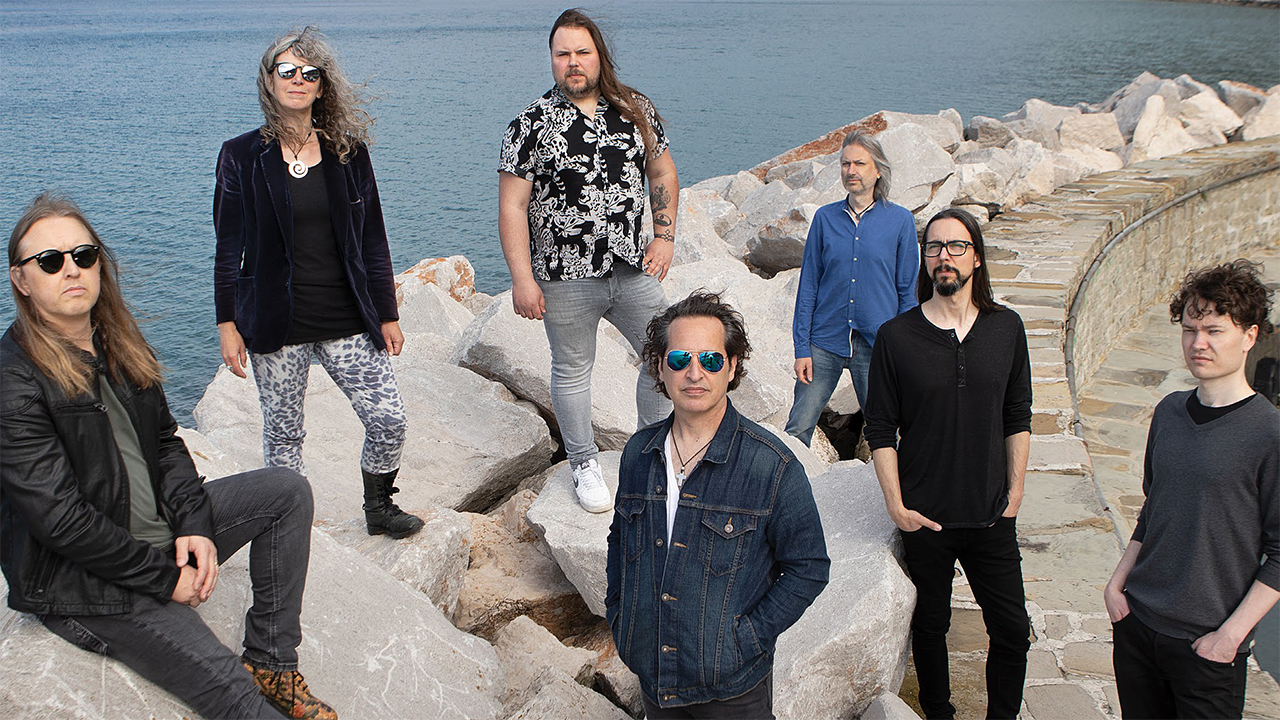“If you don’t get it, you’re all idiots!” He went to no.1, ruled at Back To The Beginning, and – with a double concept album in two parts – he wants to compete with the greats. Is Yungblud the rock star we need right now?
Yungblud collabs with Louder to discuss new album Idols Pt 1 and taking his seat at the 'big boys' table'. "Rock music has got such a turned-up nose…”
Select the newsletters you’d like to receive. Then, add your email to sign up.
You are now subscribed
Your newsletter sign-up was successful
Want to add more newsletters?
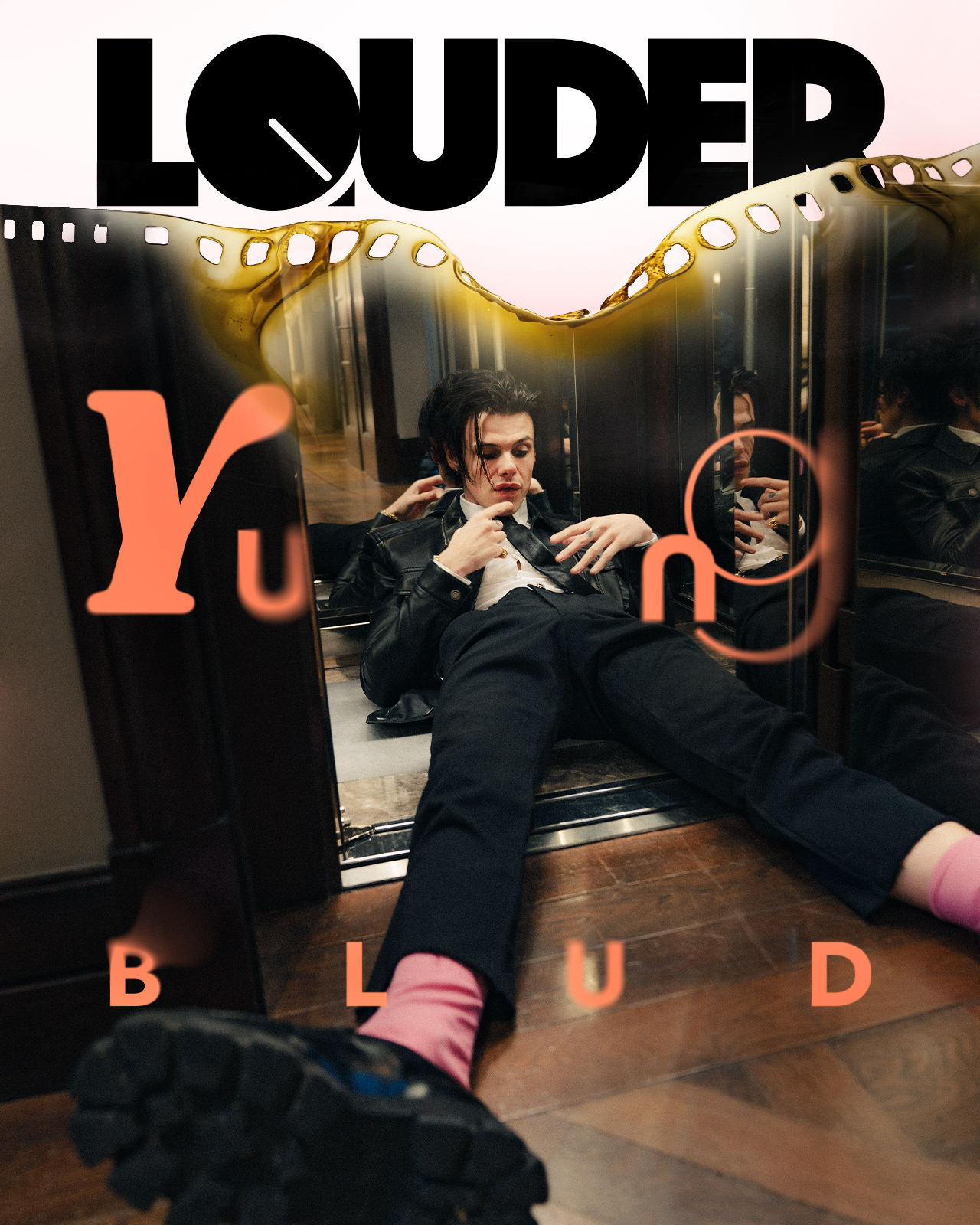
Dominic ‘Yungblud’ Harrison is 10 minutes late for our interview. “So sorry,” he says apologetically when he does turn up. He’s just had a boxing session, and is still wearing the gear he sparred in. He took up boxing a year ago and does it every morning.
“God, man, I’m literally fucking obsessed with it,” he says in his proudly undiluted Doncaster drawl. “I’ve got all this energy, and sometimes when I don’t use it all, it turns into anxiety and shit. If I do it every morning, 30 per cent of that anxiety goes away and I’m a lot more clear.”
He speaks like this all the time: a verbal rally car driver opening the throttle and flooring the accelerator, swerving this way and that, almost flying off the road, but always getting to his intended destination somehow. “I’ve got a million thoughts going through my head, I’m insecure about ten different things a minute, my ADHD’s like, bing-bing-bing-bing-bing, I’m always thinking about the next thing,” he says, not inaccurately.
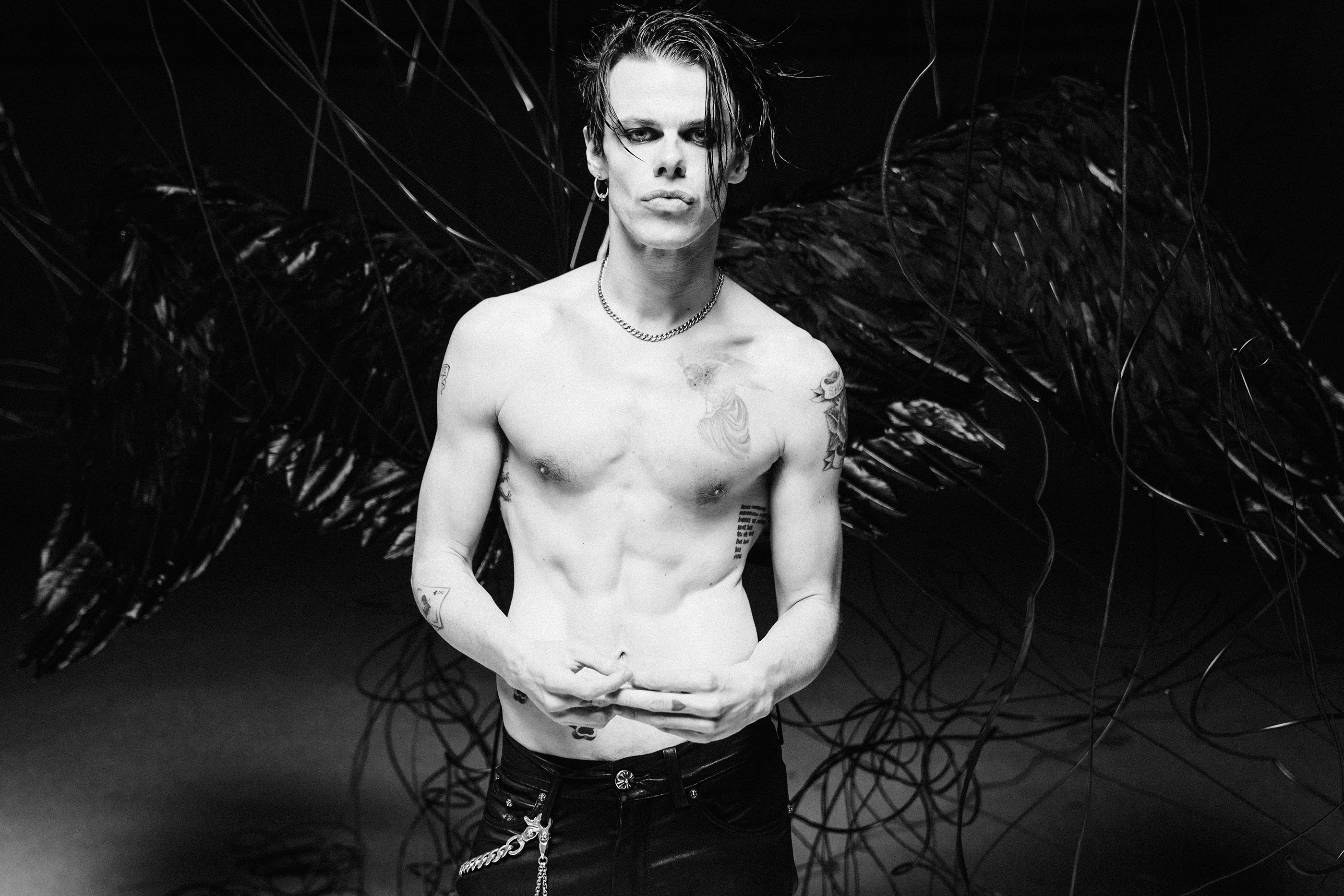
Today, all that enthusiasm is focused on his upcoming fourth album, Idols Pt 1. It represents the sharpest of left turns for the 28 year old. Where previous albums had taken a grab-it-all approach, mixing pop, punk, hip hop and anything else his magpie mind alighted on, this is a rock album to its marrow, and an outrageous one at that.
The first single and opening track, Hello Heaven, Hello, is a magnificent nine-minute blow-out that channels the spirit of Bowie, U2, The Who and Queen. The rest of the album is only slightly less ambitious. There are guitar solos and real-life orchestras, Britpop influences and swirling psychedelia, big billowing ballads and gutter level rockers, not to mention a broad if indistinct concept and a second part to follow next year. In the context of his earlier albums, it’s the maddest thing Harrison has made. In the context of Harrison himself, it makes perfect sense.
“It’s the most ambitious I’ve ever been,” he says. “I went there with this: ‘I’m going to put everything I’ve got into this shot at doing something extraordinary.’ Let’s make a double album in two parts that references Dark Side Of The Moon or Rumours or A Night At The Opera, and has an idea and a through-line and a story, as opposed to 'how many songs we can get in the fucking Top 10.’ Because why the fuck not? Let me at least try. Let me have a shot at the big boys’ table.”
There’s so much to unpack about Idols, and Harrison is here to unpack it. For the next hour he’ll talk exhilaratingly and entertainingly about everything from musicians that inspired it (“Freddie” as in Mercury, “Stevie” as in Nicks, “David” as in Bowie and Gilmour, all endearingly delivered in first name terms) to watching his unlikely friend and mentor Ozzy Osbourne slicing a salami sandwich with a machete knife while giving him careers advice. “He said, ‘You get this opportunity because you are not afraid to say the things other people will be. So when you stop fucking doing that, you ain’t a rock star any more.’”
The latest news, features and interviews direct to your inbox, from the global home of alternative music.
But at the heart of it all is Harrison himself: a 28-year-old who has built not just a successful career but an entire community centred on inclusivity and tolerance and compassion and fury at the injustice of the world. The success of last year’s inaugural Bludfest – the festival he’d created, put money into, curated and headlined – rubber-stamped him as a misfit Pied Piper for the 2020s.
But the Yungblud of Idols is a different beast. It sees him deconstructing the idea of fame and what it means to be adored, wondering who he is and what he’s doing. This is Dominic Harrison changing, moving forwards and taking a shot at greatness.
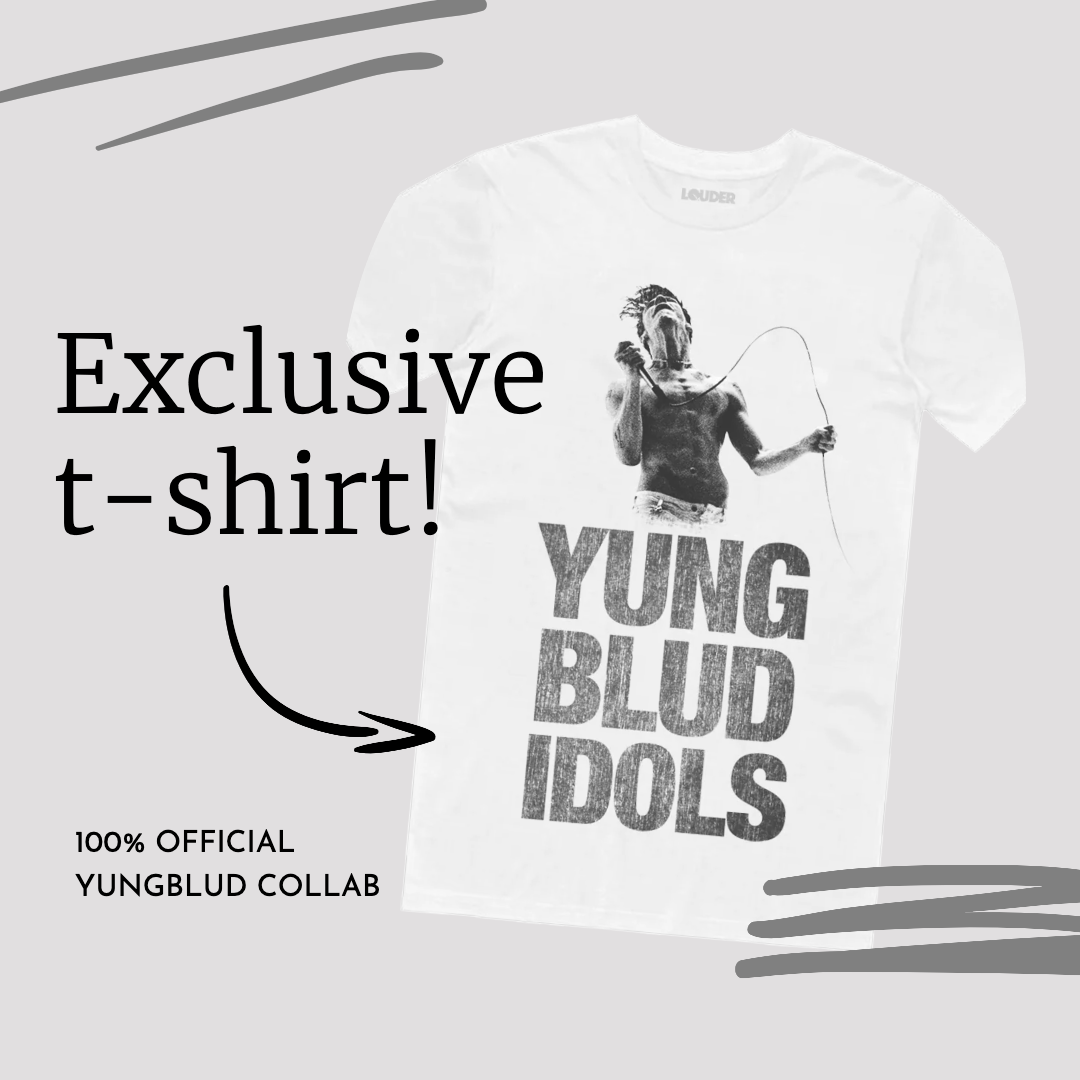
Between finishing the campaign for his third album, 2022’s Yungblud, and starting Idols, Dominic Harrison found himself in a dark place.
His career had been one continuous upswing since he released his debut album, 21st Century Liability, in 2018. 2020’s Weird! and follow-up Yungblud both reached No.1 in the UK. There were high-profile collabs with everyone from Denzel Curry to his onetime partner Halsey. He was the golden boy with mad eyes, wild hair and his mouth permanently open with his tongue sticking out.
Except the Yungblud of it all was wearing off. He was getting tired of other people’s expectations of him. “The idea of being this loud, brash staple of youth was really hard to live up to all the fucking time: ‘Do the face! Be loud!’” he says. “It was just suffocating me. I’d had four years of people either questioning whether I was real or authentic, or loving me to the point of suffocation. You walk in a pub and you don’t know if people fucking love you or hate you. I needed to take a second and evaluate what I wanted to do.”
He began drinking heavily and bingeing on food to deal with it. The way he explains it, his lifestyle was partly an attempt to reclaim his own life. “I was borderline having an eating disorder: ‘If I’m gonna eat this and do that, at least I can control it.’”
He was approaching 27 at the time, a mythical number in music for obvious reasons. It’s something he wasn’t unaware of. “I think the 27 Club is a load of bollocks, but it’s in the back of your mind,” he says. “People were worried about me. I was not well.”
It didn’t help that he hadn’t really wanted to make the Yungblud album, either. “After Weird!, I went, ‘Cool, I’ve been on this beautiful journey, now the evil eye of the mainstream is looking at us, let’s make something fucking mental, let’s really create an adventure.’ I was at a turning point.”
Harrison grew up loving the music his guitar shop-owner dad listened to: Bowie, Queen, Fleetwood Mac, Pink Floyd. He wanted to make an album that could stand alongside those – not a period piece, he says, but a living, breathing modern version.
He began writing songs that would eventually end up on Idols: the psychedelic Britpop of Lovesick Lullaby, phones-in-the-air anthem to body-positivity Zombie, the self-deconstructing Idols. He played them for his American label, expecting them to be as excited as he was.
“And they did not get it,” he says. “‘Time changes? Fucking harmonies? What?! We’ve just had a Number 1 album.’ So I was dissuaded from doing it.”
Instead, he found himself in London and LA, working with other songwriters on Yungblud, an album whose arena-pop ambitions were tattooed all over it. Commercially it was a success. Yungblud became his second No.1 and breached the Billboard Top 50. Artistically? Less so.
“I was repeating myself in the name of listening to other people,” he says. “I’d really lost who I was.”
He wouldn’t make the same mistake next time. After he’d done with Yungblud, he took control of his drinking and his eating, began boxing training and picked up where he’d left off a couple of years earlier with Idols.
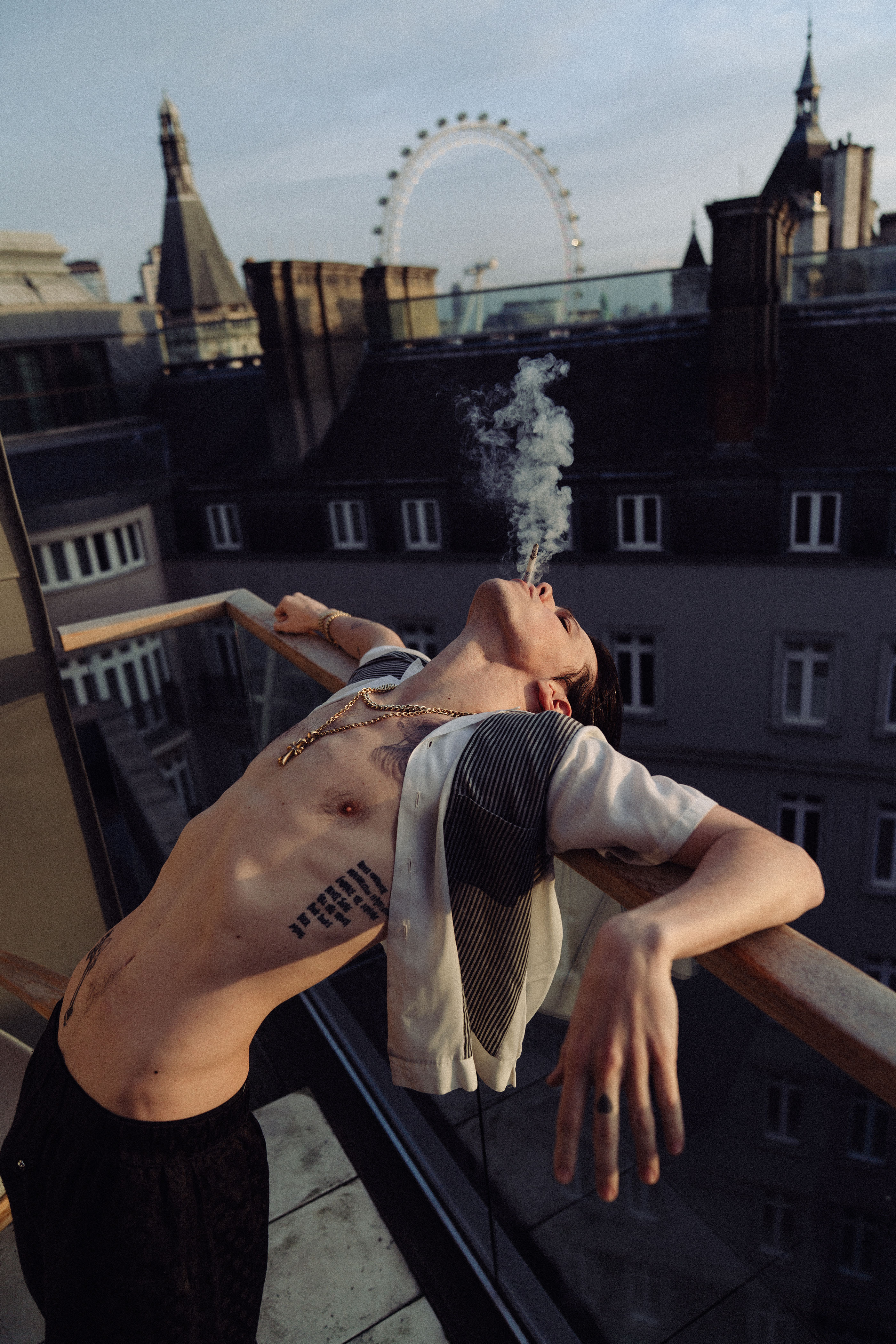
This reset wasn’t just mental, it was geographical. He recorded Idols at a converted Tetley brewery in Leeds, 30 miles from where he grew up in Doncaster. He says the old foreman’s house where he worked on the album was haunted by the spirits of two men who had died there. “I like the ghosts,” he insists. “I talk to the ghosts. It was, like, ‘This fucking feels right.’”
There was more than paranormal activity behind the decision to work in Leeds. It was a chance to reconnect with the person he was in danger of losing.
“I needed to be in the north,” he says. “Timothy Taylor’s ale and my best mates and the smell you get in northern England when the rain bounces off the gravel because the roads haven’t been tarmacked properly for years. I needed all that just to be, like: ‘Who the fuck are you, man, as a human?’, without anybody else’s opinion, good or bad.”
This kind of self-searching is all over the new album. The reason he called it Idols, he says, is because he decided to stop looking to other people for answers. He’s not embracing his own idols, he’s pushing them away. And he wants other people to do the same with theirs, up to and including Yungblud himself.
“It’s about self-reclamation,” he says. ”It’s a concept album about relinquishing your idols and finding the answers to your own life. You look at a photograph on a wall, you want to be that photograph. In my case, you end up as that photograph. But then you realise the photograph never had any answers, it’s me who had the answers all the time.”
A video that went viral on social media illustrates this idea better than Harrison can. It was filmed in Amsterdam in March 2025, just a couple of weeks before we speak, and features an impromptu interaction with a fan.
“You saved my life,” the fan tells him, teary with emotion.
“No you saved your own life, I didn’t save your life,” Harrison replies. “Maybe the music was the soundtrack, but you saved your own life OK?” He gives her a hug. “I love you. Don’t be sad, be happy.”
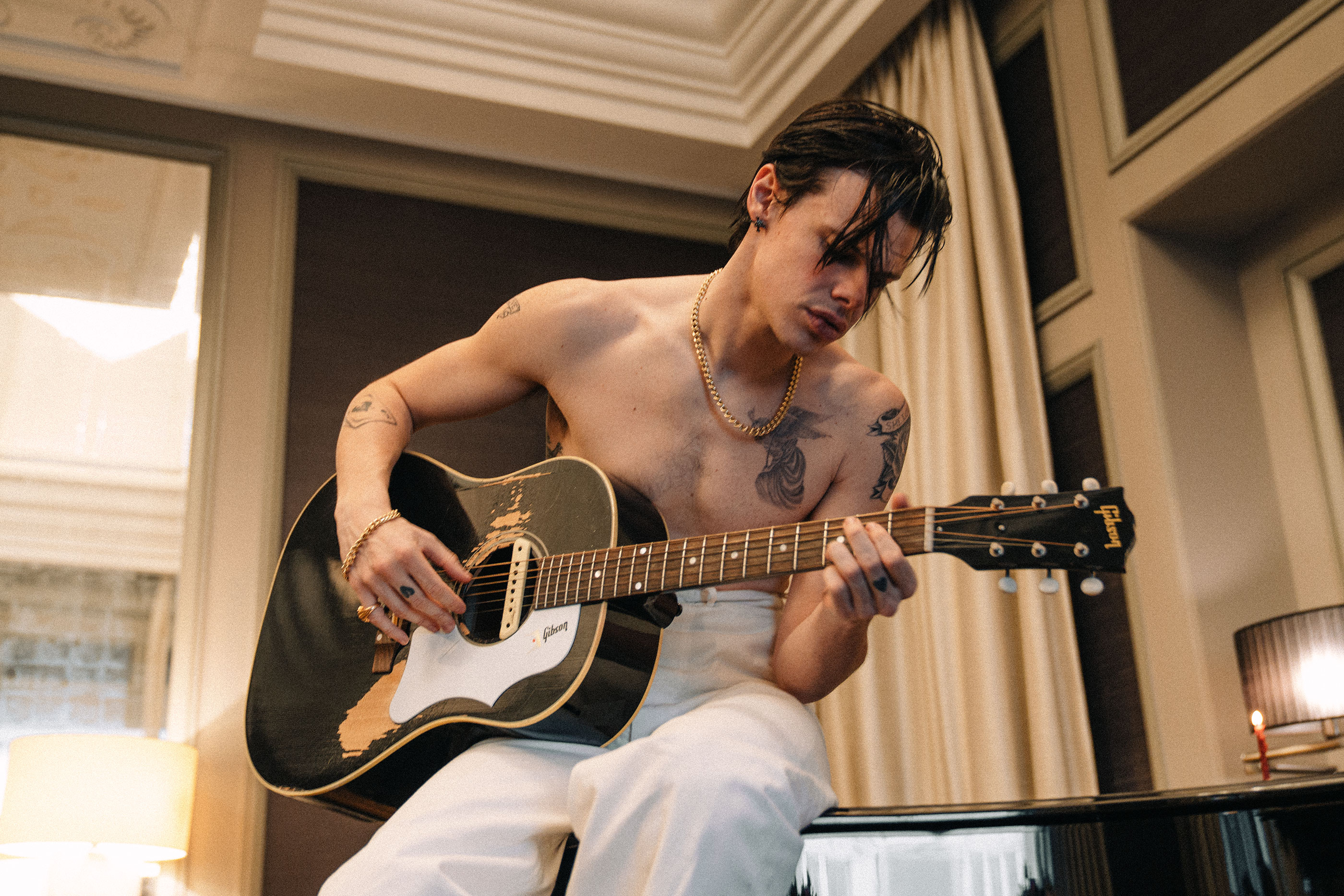
“And I got back to the hotel and I really digested that,” he says. “Like, this is the fundamental thing that I want to say on this album. The answers are within us all. When you relinquish the glorification of something, it all comes down to what’s inside you.”
Self-awareness is the lyrical engine that drives Idols. This is Yungblud breaking down not just what it means to be famous, but what it means to be Yungblud. The choice to deliver it as a modern day rock concept album at a time when rock’s cultural power is diminished makes is a bold-verging-on-insane one. Weird!: The Sequel it isn’t.
“The thing about rock is that it’s got such a fucking turned-up nose,” he says, with the passion of someone who knows the subject well enough to draw attention to its flaws. “Fuck the comments sections, fuck the people that will hate on it. I want to inspire young kids in bands. Make it, say it, do it, fucking live it. Bollocks, it doesn’t matter.”
That kind of talk makes for great copy but there’s another dimension to this. Viewed from one angle, Harrison has had it easy so far. Yes, his music and natural ebullience has attracted a lot of very vocal detractors, which in turn hasn’t done much for his mental health. But he’s built the kind of devoted fanbase that rarely happens these days.
There’s a danger that Idols could baffle or even alienate some of those fans. Part of the pull of Yungblud is that he’s the relatable outsider, the wild guy doing the crazy things that most people never get a chance to do. Releasing an album that is so obviously his shot at becoming one of the all-time greats is one of the least outsidery things he could do.
“No, because I’m not trying to be like them,” he counters, meaning his own heroes. “I’m doing what I want, with my best friends, going ‘Fuck the people who love me, fuck the people who hate me, fuck the journalists, fuck everyone!’”
What if people don’t get it?
He laughs. “Fuck it! You’re all idiots! I love it!”
No, seriously. What if it falls flat on its arse?
“No, that’s my point. If I have to leave everyone behind, can I honestly stand behind this album and say, ‘Yep, this is my statement, this is my truth’? And I can. I believe that if it falls flat on its arse right now, people will get where I was at someday.”
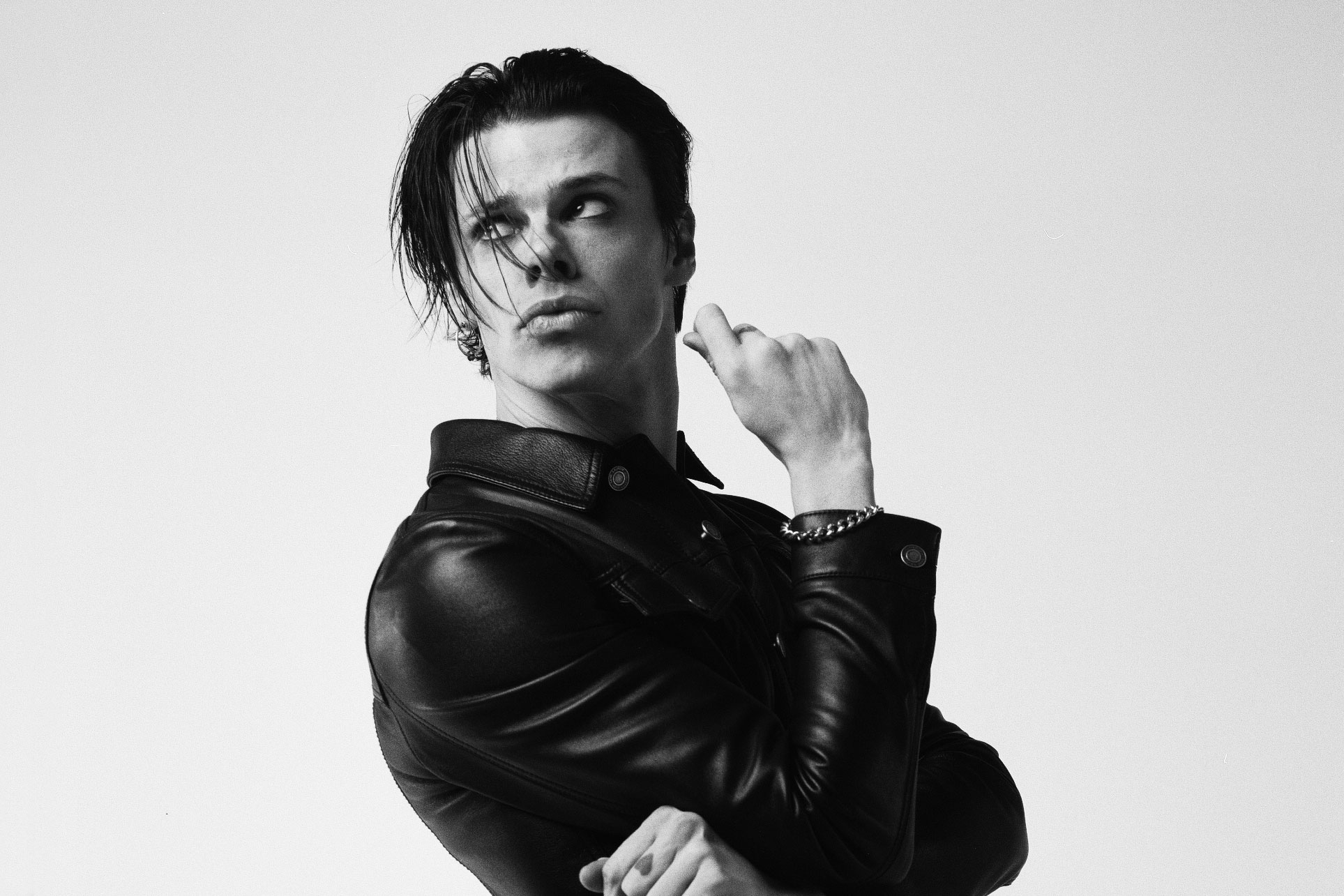
Whether Harrison would be as bullish if Idols doesn’t live up to expectations is hypothetical at this stage, though in his defence he probably would be. But it would also be hugely unfair if that happens. Idols deserves an audience that appreciates its ambition. This isn’t an album that’s bowing before the greats that Harrison worships. It’s an album that wants to elbow its way among them and say, ‘Listen to this.”
He’s certainly confident enough in it to be releasing a second half, Idols Pt 2, next year. “I see Idols Pt 1 as the light and Idols Pt 2 as the darkness,” he says. “I’d say Idols Pt 2 is a little heavier musically.”
He toyed with the idea of releasing the whole thing as an old-school double album, but figured that might be overwhelming. “I want to prolong the journey, as opposed to being: ‘Here it is, all now! Fucking stimulate yourselves and then forget about it, like every other song on the radio!’”
Idols is released on June 20, the day before the second Bludfest at Milton Keynes Bowl. He plans to play a good chunk of the new album at the festival, but he’ll be airing it in full on his own tour later in the year.
“My vibe is I’m going to play the album from start to finish with an orchestra, have an interval, then come on and play some hits,” he says of the latter. “It’s gonna be an adventure when you see it live. One minute you‘re going mental, one minute you’re crying, one minute you’re turning to your mate and telling them you love them, one minute you’re moshing. I want it to be like a religious experience.”
He could carry on like this for days, but the whirring wheel of colour and noise that’s constantly spinning in his head needs to temporarily take a back seat to the practicalities of being a musician with a new album on the horizon. There are meetings to be had, decisions to be made. Grown-up stuff, basically.
“I didn’t write this album because I need to grow up,” he says. “I wrote it because I was changing, I am changing.
"I’m going to a different place in terms of my security within myself and my confidence. I wanted to make an album for myself again.”
Idols Pt 1 is out on June 20 via Locomotion/Island Records. Bludfest 2025 takes place June 21 at the Milton Keynes Bowl. Check out our exclusive Yungblud T-shirt featuring hand-drawn lyrics, only at the Louder store.
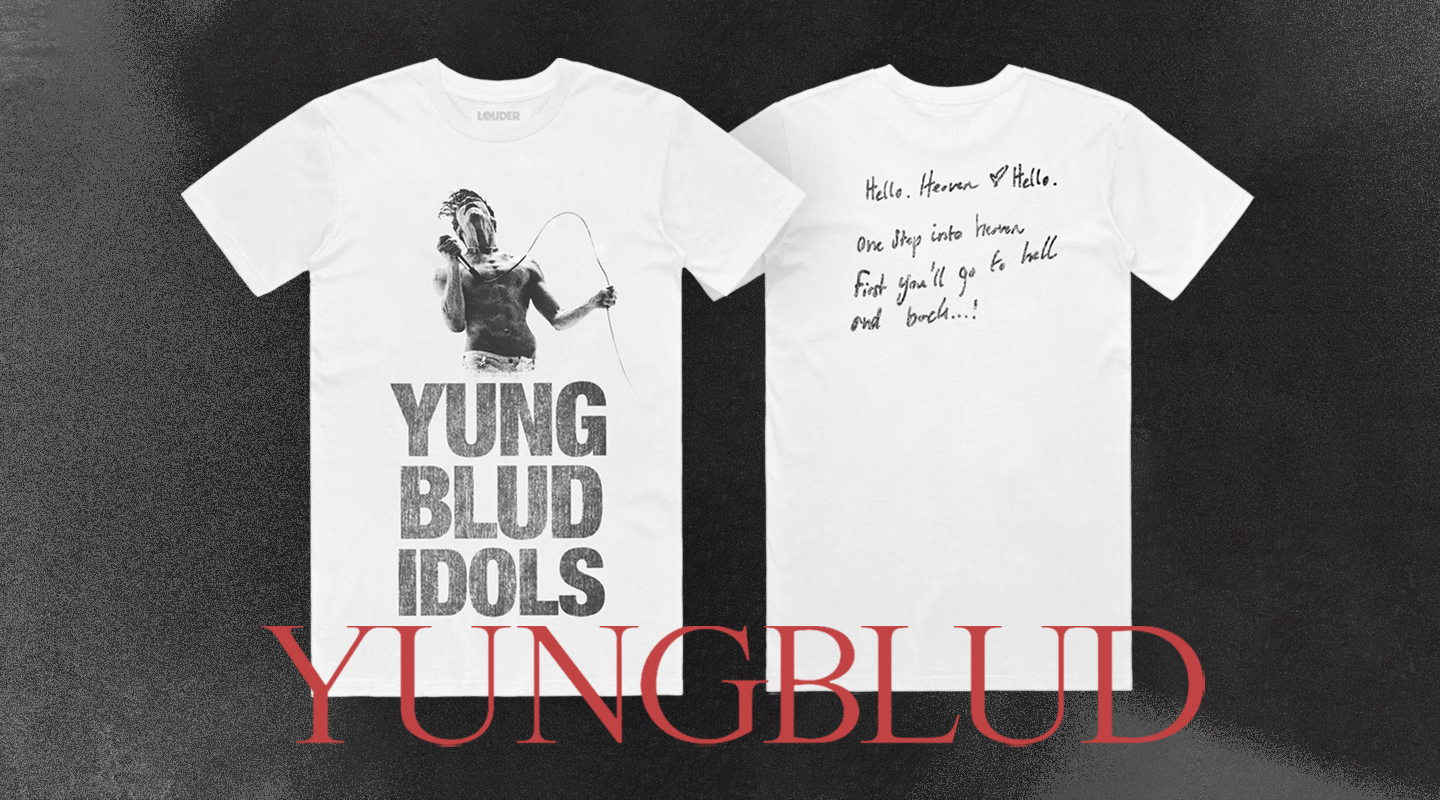
Dave Everley has been writing about and occasionally humming along to music since the early 90s. During that time, he has been Deputy Editor on Kerrang! and Classic Rock, Associate Editor on Q magazine and staff writer/tea boy on Raw, not necessarily in that order. He has written for Metal Hammer, Louder, Prog, the Observer, Select, Mojo, the Evening Standard and the totally legendary Ultrakill. He is still waiting for Billy Gibbons to send him a bottle of hot sauce he was promised several years ago.
You must confirm your public display name before commenting
Please logout and then login again, you will then be prompted to enter your display name.




